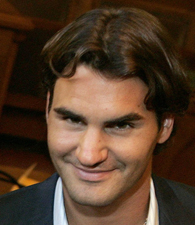Roger Federer is leading men’s tennis into a new generation of high intensity, skillful play. But this emotional phenom has had to overcome heartache, reign in his strong temper and raise his game to new heights to succeed.
Roger Federer’s Early Days
Roger Federer was born into a family of passionate tennis fans on August 8, 1981, in Basel, Switzerland. Raised in Münchenstein, a town outside of Basel. Roger played in the Basel junior program, and looked up to fiery German tennis star Boris Becker.
When he was just 13, Roger accepted an invitation to the Swiss national training center near Lausanne, where French was the primary language. German-speaking Roger felt isolated and dreaded returning to the training center after weekends at home with his family. He stuck with the program, though, and his dedication would soon pay off.
In 1998, Federer’s game began coming together. He was the International Tennis Federation’s top-ranking player, winning the Wimbledon junior singles and doubles titles, and finishing strong in other prominent junior tournaments.
Federer is known for being emotional on the court, often crying when victorious. But when he was younger, the tears were often borne of pain, not joy. In an interview with The Guardian, Federer said, “I don’t cry at movies too often. But on the tennis court I find it hard to keep my emotions together. As a teenager I would cry after almost every match I lost for about half an hour.”
However, one particular off-the-court incident had Federer reeling. In 2002, his first coach, Australian Peter Carter, was killed in a car crash during a safari in South Africa.
Of Carter, Federer said, “He is the one person who truly opened my eyes to what I could achieve, because maybe I was not taking the game seriously enough at times.”
Sources in this Story
- Jockbio: Roger Federer
- The Guardian: It’ll all end in tears
- Sports Illustrated: Roger Federer’s Grand Slam Titles
- The New York Times: Federer as Religious Experience
- The Telegraph: Roger Federer vs Rafael Nadal: The five ages of tennis’s greatest rivalry
- NPR: Federer Vs. Nadal: ‘Strokes Of Genius’
- ESPN (AP): Federer triumphs in another English epic
- Sports Illustrated: Roger Federer gets 85th match win at Wimbeldon
- RogerFederer.com: Profile
Federer’s Record-Breaking Tennis Career
Federer debuted on the pro tour in 1998. Despite showing great promise, he failed to win any ATP tournaments in his first three years. “In professional tennis, the only crime worse than lacking world-class talent is squandering it,” says Jockbio. “For years, the curse of untapped potential hung around Roger Federer’s neck like an anvil, as the waited with growing impatience for his big breakthrough.”
In 2001, Federer won his first pro tournaments and stunned four-time defending champion Pete Sampras in the Wimbledon quarterfinals. Two years later, he won Wimbledon, his first grand slam victory, and the first for a Swiss man. He did so in stunning fashion, wrote The Associated Press, “ripping returns on serves that made line judges, ball boys and spectators flinch” in a three-set win over Mark Philippoussis.
Federer opened 2004 with a victory at the Australian Open, which earned him the No. 1 ranking. He remained No. 1 for a record four and a half years, during which he won 44 titles, including 10 Grand Slams.
Federer’s play is so beautiful, that David Foster Wallace likened watching him to a religious experience. He wrote in The New York Times, “His anticipation and court sense are otherworldly, and his footwork is the best in the game…He has, figuratively and literally, re-embodied men’s tennis, and for the first time in years the game’s future is unpredictable.”
Only Spain’s Rafael Nadal could challenge Federer’s dominance, beating him repeatedly on the clay court of the French Open. Their rivalry, one of the greatest in tennis history, was cemented at the 2008 Wimbledon final, when Nadal trumped Federer in a five-set thriller widely considered the greatest ever Wimbledon final.
“It really was this dethroning,” said Jon Wertheim, author of “Strokes of Genius: Federer, Nadal, and the Greatest Match Ever Played,” to NPR. “And you really felt as they stood there on the court, Federer, an emotional guy to begin with, is starting to leak tears, and his voice is starting to catch.”
Though Federer soon lost his No. 1 ranking and his air of invincibility, he rebounded with a victory at the U.S. Open. In 2009, he won the French Open for the first time and reclaiming the No. 1 ranking. At Wimbledon, he played in another epic final, this time by beating Andy Roddick 16-14 in the deciding fifth set.
It was his 15th Grand Slam win, surpassing Sampras’ record of 14 Grand Slams. “The guy, he’s a legend,” remarked Sampras. “Now he’s an icon.”
The Rest of the Story
At Wimbeldon in 2017, Federer won his 85th career match. In 2009 he married Mirka Vavrinec, and the couple has two sets of twins. According to his official website, he holds the record for most Grand Slam men’s singles championships (18), and has played in 28 finals.
Find Federer’s career statistics and highlights at the ATP Web site.
This article was originally written by Sarah Amandolare; it was updated July 7, 2017.











